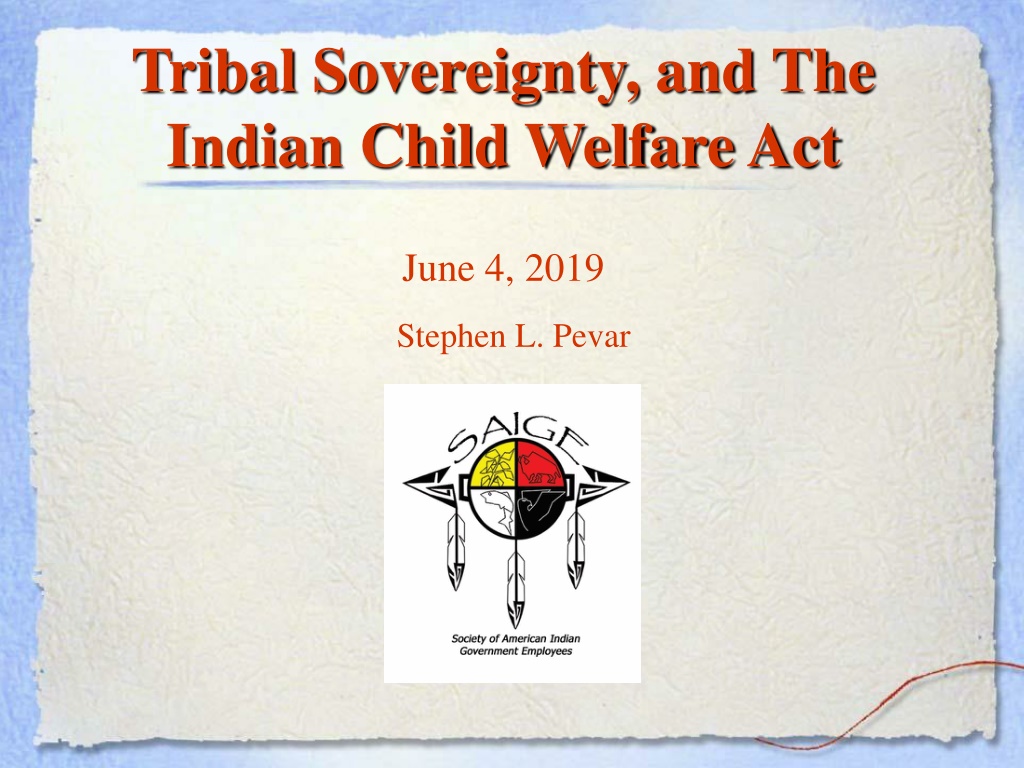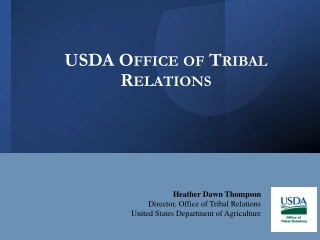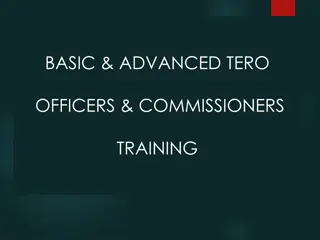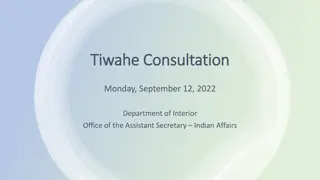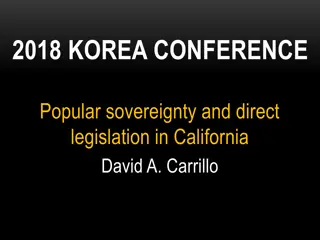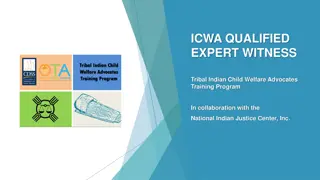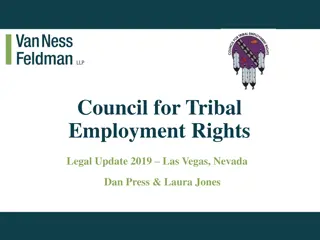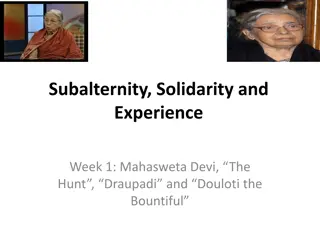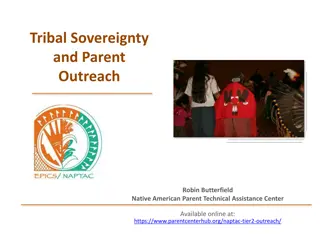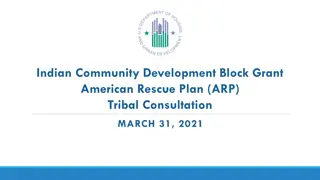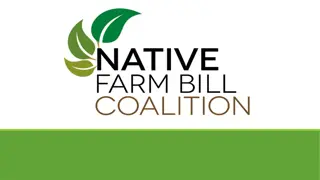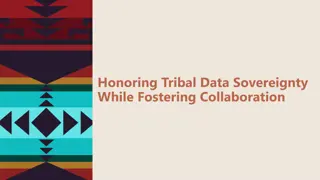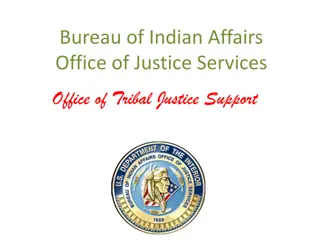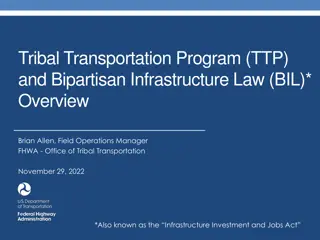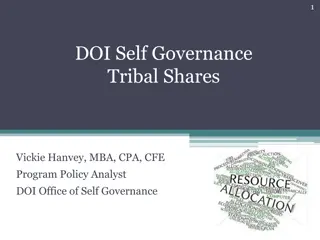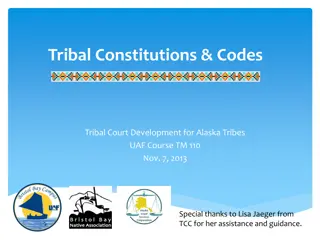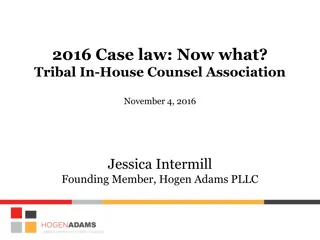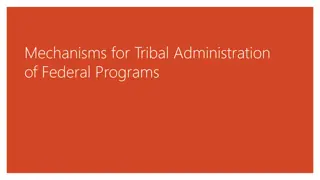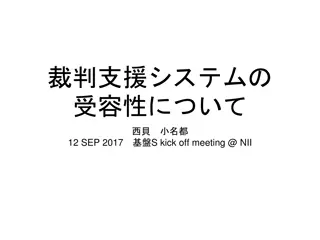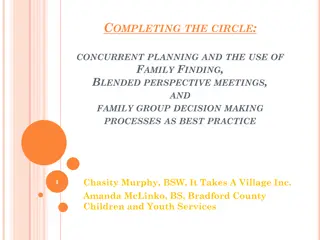Understanding Tribal Sovereignty and the Indian Child Welfare Act
Tribal sovereignty is a fundamental right for Indian tribes, allowing them to be self-governing. The concept of sovereignty entails independent and supreme authority to make and enforce laws. This article explores whether tribal governments are sovereign entities, presenting different viewpoints and the Supreme Court's stance on the matter.
Download Presentation

Please find below an Image/Link to download the presentation.
The content on the website is provided AS IS for your information and personal use only. It may not be sold, licensed, or shared on other websites without obtaining consent from the author. Download presentation by click this link. If you encounter any issues during the download, it is possible that the publisher has removed the file from their server.
E N D
Presentation Transcript
Tribal Sovereignty, and The Indian Child Welfare Act June 4, 2019 Stephen L. Pevar
Tribal Sovereignty: Uniquely Important Indian tribes have many rights, but the single most important and most cherished is the right of tribal sovereignty, the right to be self- governing.
What is "Sovereignty"? Dictionary definition: A sovereign government is a government that is vested with independent and supreme authority. It has the power to make its own laws, and to then enforce those laws. Under a dictionary definition, sovereignty is all or nothing.
Are Tribal Governments Sovereign? Three possible answers: 1. Yes: Indian tribes are sovereign governments and the United States must relate to them in that manner, same as with England and France.
Are Tribal Governments Sovereign? 2. No: Indian tribes are conquered nations. As a result, they have lost all of their sovereign authority.
Are Tribal Governments Sovereign? (cont.) 3. Yes and No: Indian tribes are quasi- sovereign, possessing attributes of sovereignty. Indian tribes retain some of their inherent powers of self-government, but tribes are subject to the supreme ( plenary ) power of the United States.
Are Tribal Governments Sovereign? (cont.) The Supreme Court developed this middle ground in a line of cases beginning in the 1820s. As summarized in United States v. Lara, 541 U.S. 193 (2004): (1) Congress has plenary power over Indian tribes: The Constitution grants Congress board general powers to legislate in respect to Indian tribes, powers that we have consistently described as plenary and exclusive. (2) However, those rights not removed from tribes remain as part of their inherent authority. Indian tribes are unique aggregations, possessing attributes of sovereignty over both their members and their territory.
Criticism of the Plenary Power Doctrine: Might Doesn't Make Right The plenary power doctrine is firmly established in federal law. All 3 branches of the federal government accept it. However, the doctrine has been extensively criticized. After all, there is nothing in the Constitution that authorizes the federal government to legislate over Indian tribes. The Supreme Court relies primarily on the Commerce Clause, but that Clause says only that Congress shall have the power To regulate commerce with foreign Nations, and among the several States, and with the Indian tribes. Art. I, Sec. 8, Cl. 3. That language confers no greater power over Indian tribes than over foreign Nations.
Criticism of the Plenary Power Doctrine: Might Doesn't Make Right (cont.) The plenary power was seemingly plucked out of thin air by the Supreme Court. Walter Echo-Hawk, In the Courts of the Conqueror: The Ten Worst Indian Law Cases Ever Decided (2010) at page 163. The plenary power doctrine was adopted by the Supreme Court to justify federal land acquisition and power in Indian affairs. Frank Pommersheim, Broken Landscape: Indians, Indian Tribes, and the Constitution (2009) at page 140.
Three Principles Regarding Tribal Sovereignty 1. Indian tribes do retain certain inherent powers of a sovereign. 2. Congress, however, has the power to limit or abolish tribal authority. 3. In addition to the express limits that Congress has placed on tribal powers, there are certain implied limits, especially concerning non-Indians.
First Principle: Indian Tribes Retain Inherent Authority 1. Worcester v. Georgia, 31 U.S. 515 (1832). Indian nations had always been considered as distinct, independent political communities, retaining their original rights, as the undisputed possessors of the soil from time immemorial. . . .The Cherokee nation, then, is a distinct community, occupying its own territory, with boundaries accurately described, in which the laws of Georgia can have no force, and the citizens of Georgia, have no right to enter, but with the assent of the Cherokees themselves, or in conformity with treaties, and with the acts of Congress.
First Principle: Indian Tribes Retain Inherent Authority (cont.) 2. Talton v. Mayes, 163 U.S. 379 (1896). It cannot be doubted, as said in Worcester, that . . . The Indian nations had always been considered as distinct, independent political communities, retaining their original natural rights. . . . [Because] the powers of local self-government enjoyed by the Cherokee Nation existed prior to the constitution, they are not operated upon by the fifth amendment.
Second Principle: Congress Can Limit or Abolish Tribal Powers 1. Worcester v. Georgia, 31 U.S. 515 (1832). 2. Lone Wolf v. Hitchcock, 187 U.S. 553 (1903).
Third Principle: Implied Limits on Tribal Power over Non-Indians Oliphant v. Suquamish Indian Tribe, 435 U.S. 191 (1978). Indian tribes are prohibited from exercising both those powers of autonomous states that are expressly terminated by Congress and those powers inconsistent with their status. [Indian tribes do not] retain the power to try non-Indians according to their own customs and procedure.
Summary (contd) Indian tribes are neither states, nor part of the federal government, nor subdivisions of either. Rather, they are sovereign political entities possessed of sovereign authority not derived from the United States, which they predate. [Indian tribes are] qualified to exercise powers of self-government . . . by reason of their original tribal sovereignty. National Labor Relations Board v. Pueblo of San Juan, 276 F.3d 1186, 1192 (10th Cir. 2002).
Summary Some tribal powers have been expressly limited or abolished by Congress, and others have been lost by implication. But Indian tribes still have vast, inherent powers, particularly over their members and territory. Congress has passed laws that encourage and affirm the exercise of tribal powers, and one of these is the Indian Child Welfare Act of 1978.
ICWA: Historical Background Beginning in the mid-1800s, public and private agencies, with the federal government s consent, routinely removed Indian children from their homes. A congressional investigation in the 1970s revealed: 1. 25-35% of all Indian children in the US were being taken from their families by state welfare agencies. 2. In some states, Indian children were 7 to 8 times more likely to be removed than white children. 3. The vast majority of these Indian children were placed in non-Indian homes.
Historical Background (cont.) 4. State judges and social workers were often prejudiced against Indians and ignorant of tribal values and customs. Congress found that state officials have often failed to recognize the . . . cultural and social standards prevailing in Indian communities and families. --25 U.S.C. 1901 5. These removals were disastrous not only for many Indian children and their families but also for their tribes. Tribes were being robbed of their youth.
ICWAs Purpose Congress passed ICWA to create minimum Federal standards for the removal of Indian children from their families and the placement of such children in foster or adoptive homes. --25 U.S.C. 1902 ICWA contains protections for both Indian families and Indian tribes. Congress was concerned not solely about the interests of Indian children and families, but also about the impact on the tribes themselves of the large numbers of Indian children adopted by non-Indians. --Mississippi Band of Choctaw Indians v. Holyfield, 490 U.S. 30, 49 (1989)
ICWA: Major Provisions 1. If the Indian child resides on an Indian reservation or has been made a ward of the tribal court, the tribal court has exclusive jurisdiction over the child in all custody matters. State courts may not adjudicate these cases unless expressly conferred that authority by Congress. --25 U.S.C. 1911(a).
Major Provisions(cont.) 2. If the child resides off the reservation, the state court and the tribal court have concurrent (shared) jurisdiction. If the proceeding begins in state court, the court must notify the child's parents and tribe, and they each have a right to intervene in the proceeding. --25 U.S.C. 1912(a), 1911(c) respectively.
Major Provisions(cont.) 3. In all cases in state court, if the tribe or a parent requests it, the court must transfer the case to tribal court unless a parent objects or good cause exists to deny the request. --25 U.S.C. 1911(b).
Major Provisions(cont.) 4. As the tribal notice and the transfer provisions indicate, although jurisdiction is concurrent, it is presumptively tribal. Holyfield, 490 U.S. at 36. Indian tribes have independent rights under ICWA. Thus, they have rights even when both parents want to relinquish custody of their child voluntarily.
Major Provisions (cont.) 5. If the case remains in state court, the court may not terminate parental rights without proof beyond a reasonable doubt (or place the child in foster care without clear and convincing evidence ) that continued custody by the child's family is likely to result in serious emotional or physical damage to the child. (Thus, this is not a best interest of the child standard.) --25 U.S.C. 1912(f) and (e), respectively.
Major Provisions (cont.) 6. If the child's parents are indigent, they have a right to a court-appointed attorney. Separate counsel must be appointed for the child when the best interests of the child require it. --25 U.S.C. 1912(b).
Major Provisions (cont.) 7. Before a state court can remove an Indian child from the home for placement in either foster care or for adoption, testimony from qualified expert witnesses (QEW) must be submitted on the issue of whether continued placement in the home is likely to cause serious emotional or physical injury to the child. --25 U.S.C. 1912(d).
Major Provisions (cont.) 8. An Indian child may not be removed from the home for foster care or for adoption unless it is proven that active efforts have been made to provide remedial services programs designed to prevent the breakup of the Indian family and that these efforts have proved unsuccessful. and rehabilitative --25 U.S.C. 1912(d).
Major Provisions (cont.) 9. Before a state court can place an Indian child in a non-Indian adoptive home, the court must give a placement preference to, first, the child's extended family, second, other members of the child's tribe, and third, other Indian families, unless good cause exists to ignore this placement hierarchy. A similar hierarchy is imposed in foster care placements. --25 U.S.C. 1915(a) and (b), respectively.
Major Provisions (cont.) 10. Tribal court custody decisions are entitled to the same full faith and credit as state court custody decisions, meaning that they normally must be respected and enforced by other courts. --25 U.S.C. 1911(d).
Major Provisions (cont.) 11. The state must keep accurate records of all Indian child placements to which ICWA applies and make them available to the federal government and the tribe. In addition, when an adopted Indian child becomes eighteen years old, the state must provide the child upon his or her request with the names and tribal affiliation(s) of the child's biological parents. --25 U.S.C. 1915(e), 1917, respectively.
Major Provisions (cont.) 12. Whenever a child is removed by state officials in an emergency situation, a hearing must be held soon thereafter and the child must be returned to the parents unless continued removal is necessary to prevent imminent physical damage or harm to the child. Thus, the state s best interests of the child standard does not apply in emergency removals. --25 U.S.C. 1922.
Summary Thus, ICWA is a remedial law designed to protect Indians and tribes. Among other things, ICWA gives tribal courts exclusive jurisdiction when the child lives on the reservation. When the child lives off the reservation, there is concurrent but presumptively tribal jurisdiction, the Supreme Court said in Holyfield. 490 U.S. at 36. Even when a custody case remains in state court, the tribe has a right to intervene, and placement of the child is governed by ICWA s requirements.
